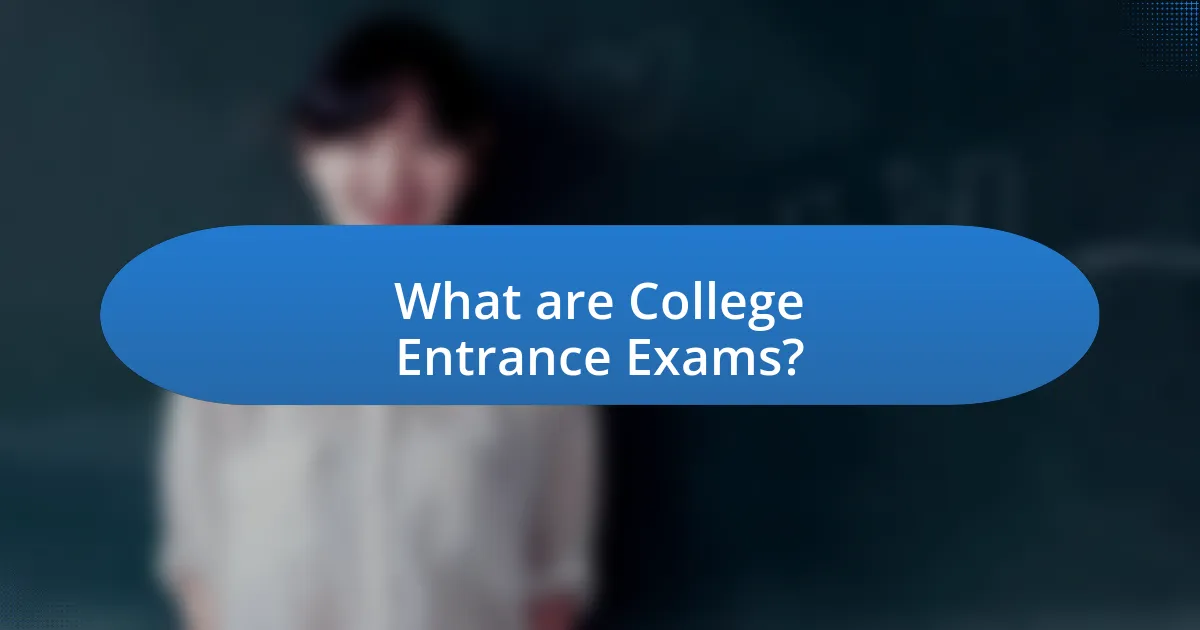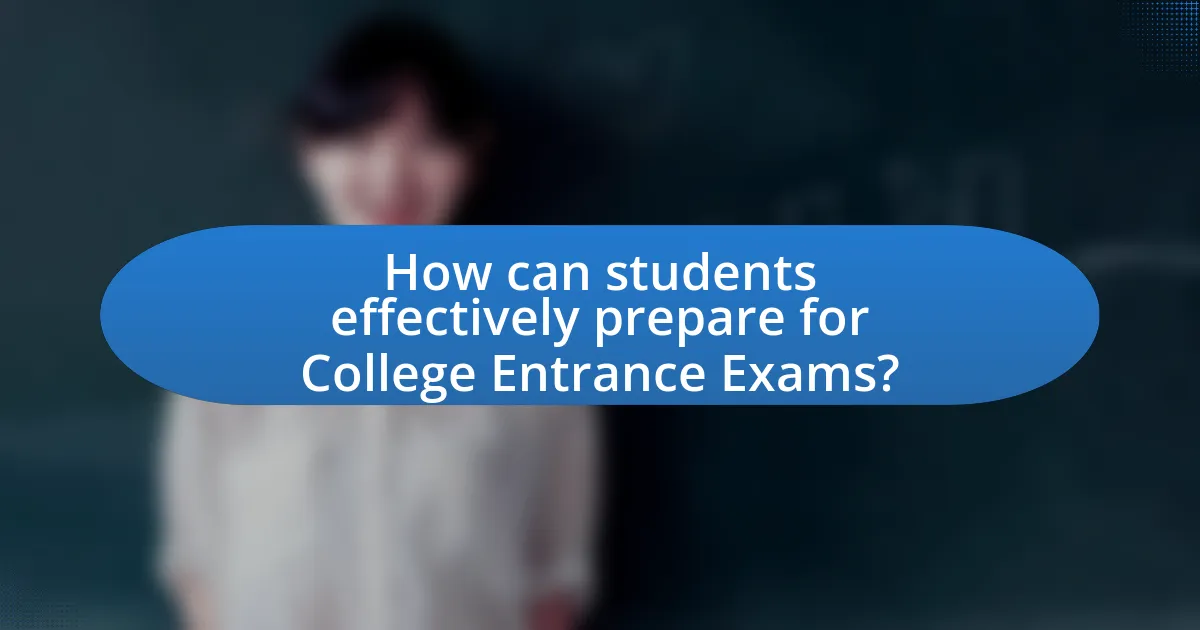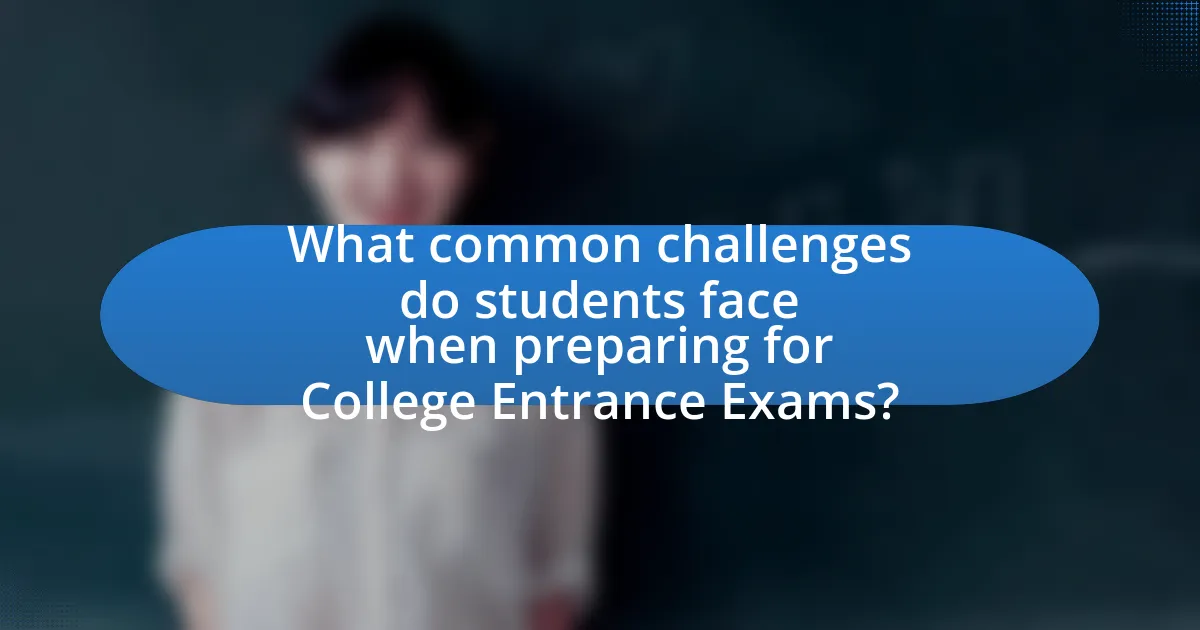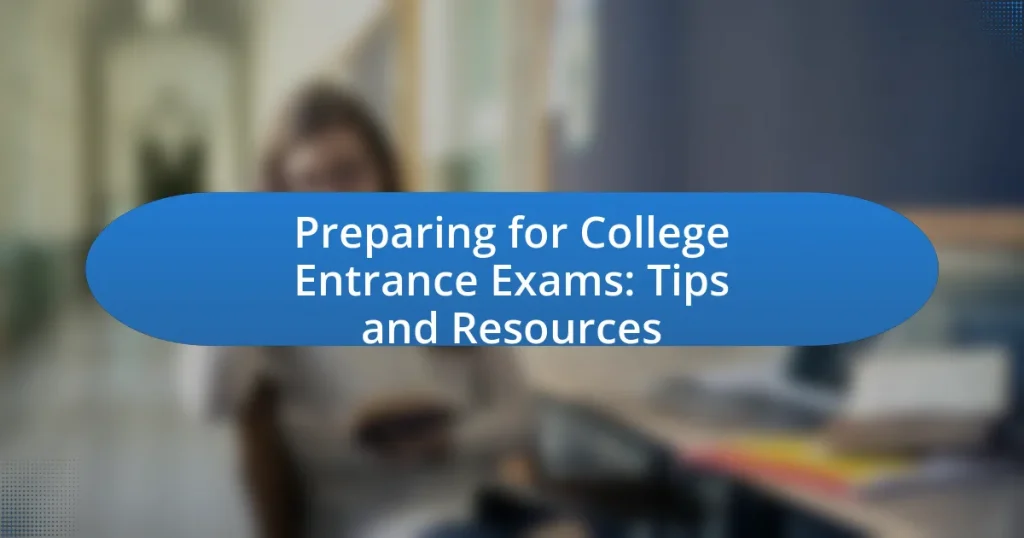College entrance exams, such as the SAT and ACT, are standardized assessments designed to evaluate a student’s readiness for college-level work, focusing on skills in mathematics, reading, and writing. These exams play a crucial role in the college admissions process, influencing admission decisions, scholarship opportunities, and course placements. The article provides an overview of the types of college entrance exams, their importance, and the subjects they cover, along with effective preparation strategies, study resources, and techniques to manage test anxiety. Additionally, it addresses common challenges students face during preparation and offers best practices for maximizing performance on exam day.

What are College Entrance Exams?
College entrance exams are standardized tests used to assess a student’s readiness for college-level work. These exams, such as the SAT and ACT in the United States, evaluate skills in areas like mathematics, reading, and writing. They serve as a critical component of the college admissions process, providing colleges and universities with a common metric to compare applicants. Research indicates that performance on these exams can significantly influence admission decisions, scholarship opportunities, and placement in college courses.
How do College Entrance Exams differ from other tests?
College entrance exams differ from other tests primarily in their purpose and impact on academic progression. These exams, such as the SAT and ACT, are specifically designed to assess a student’s readiness for college-level work and play a crucial role in college admissions decisions. Unlike standardized tests used for classroom assessments or state evaluations, college entrance exams are often used to compare students from different educational backgrounds on a national scale. For instance, the SAT assesses skills in reading, writing, and math, providing colleges with a standardized metric to evaluate applicants. This unique function underscores their significance in determining college admissions, scholarships, and placement in academic programs.
What types of College Entrance Exams are available?
The types of college entrance exams available include the SAT, ACT, and various subject-specific tests such as Advanced Placement (AP) exams and International Baccalaureate (IB) exams. The SAT is a standardized test widely used for college admissions in the United States, assessing skills in reading, writing, and mathematics. The ACT serves a similar purpose but includes a science reasoning section. AP and IB exams allow high school students to earn college credit based on their performance in specific subjects. These exams are recognized by many colleges and universities as part of their admissions process, demonstrating students’ readiness for higher education.
Why are College Entrance Exams important for college admissions?
College entrance exams are important for college admissions because they provide a standardized measure of a student’s academic readiness for higher education. These exams, such as the SAT and ACT, assess critical skills in areas like mathematics, reading, and writing, which are essential for success in college-level coursework. Research indicates that colleges often use these scores to compare applicants from diverse educational backgrounds, helping to predict their potential performance in college. For example, a study by the College Board found that SAT scores correlate with first-year college GPA, reinforcing the exams’ role in evaluating student preparedness.
What subjects are typically covered in College Entrance Exams?
College entrance exams typically cover subjects such as mathematics, reading comprehension, writing, and science. These subjects are designed to assess a student’s readiness for college-level coursework. For instance, standardized tests like the SAT and ACT include sections that evaluate mathematical skills, critical reading abilities, and writing proficiency, which are essential for academic success in higher education.
How is the content of College Entrance Exams structured?
The content of College Entrance Exams is structured into several key sections, typically including mathematics, reading comprehension, writing, and sometimes science. Each section assesses specific skills: the mathematics section evaluates problem-solving and quantitative reasoning, the reading comprehension section measures critical reading and analytical skills, and the writing section focuses on grammar, usage, and essay composition. For example, standardized tests like the SAT and ACT have defined formats where the SAT includes a Math section with multiple-choice and grid-in questions, while the ACT features a Science section that tests interpretation and analysis of scientific information. This structured approach ensures that students are evaluated on a comprehensive set of skills necessary for college readiness.
What skills are assessed in College Entrance Exams?
College Entrance Exams assess critical skills such as reading comprehension, mathematical reasoning, and writing proficiency. Reading comprehension evaluates the ability to understand and analyze texts, while mathematical reasoning tests problem-solving skills in areas like algebra and geometry. Writing proficiency measures the ability to articulate ideas clearly and effectively in written form. These skills are essential for academic success in college, as they reflect a student’s preparedness for higher education challenges.

How can students effectively prepare for College Entrance Exams?
Students can effectively prepare for College Entrance Exams by creating a structured study plan that includes regular practice tests, review of key concepts, and time management strategies. Research indicates that students who take practice exams under timed conditions improve their performance by familiarizing themselves with the test format and pacing. Additionally, utilizing resources such as prep books, online courses, and tutoring can enhance understanding of challenging subjects. A study by the College Board found that students who engaged in consistent study habits and utilized available resources scored significantly higher than those who did not.
What study strategies are most effective for College Entrance Exams?
Effective study strategies for College Entrance Exams include active recall, spaced repetition, and practice testing. Active recall involves retrieving information from memory, which enhances retention; studies show that this method significantly improves long-term memory retention compared to passive review techniques. Spaced repetition, which spaces out study sessions over time, has been proven to increase retention rates by allowing the brain to consolidate information more effectively. Practice testing, where students take practice exams under timed conditions, not only familiarizes them with the exam format but also helps identify areas needing improvement. Research indicates that students who utilize these strategies score higher on standardized tests, demonstrating their effectiveness in preparing for College Entrance Exams.
How can practice tests improve performance on College Entrance Exams?
Practice tests can significantly improve performance on College Entrance Exams by familiarizing students with the exam format and question types. Engaging in practice tests allows students to identify their strengths and weaknesses, enabling targeted study efforts. Research indicates that students who regularly take practice tests score higher on actual exams; for instance, a study published in the journal “Psychological Science” found that practice testing enhances retention and understanding of material. Additionally, practice tests help reduce test anxiety by simulating the testing environment, which can lead to improved performance on the actual exam day.
What role does time management play in exam preparation?
Time management is crucial in exam preparation as it allows students to allocate sufficient time for studying, practice, and review, thereby enhancing their understanding and retention of material. Effective time management strategies, such as creating a study schedule and prioritizing tasks, enable students to cover all necessary topics systematically. Research indicates that students who employ structured time management techniques score higher on exams, as they can reduce stress and avoid last-minute cramming, which negatively impacts performance. For instance, a study published in the Journal of Educational Psychology found that students who planned their study time effectively achieved better academic outcomes compared to those who did not.
What resources are available for College Entrance Exam preparation?
A variety of resources are available for College Entrance Exam preparation, including online courses, study guides, practice tests, and tutoring services. Online platforms like Khan Academy and Coursera offer free and paid courses specifically designed for exams such as the SAT and ACT, providing structured learning paths and practice materials. Additionally, published study guides from companies like The Princeton Review and Kaplan include comprehensive content reviews and practice questions that align with the exam formats. Furthermore, many high schools and community colleges offer tutoring programs or workshops that focus on test-taking strategies and subject-specific content, enhancing students’ readiness for these exams.
How can online platforms assist in exam preparation?
Online platforms assist in exam preparation by providing access to a wide range of study materials, practice tests, and interactive learning tools. These platforms often feature resources such as video lectures, quizzes, and flashcards that cater to various learning styles, enhancing comprehension and retention. For instance, platforms like Khan Academy and Coursera offer structured courses specifically designed for college entrance exams, which include practice questions and performance analytics to track progress. Research indicates that students who utilize online resources for exam preparation tend to achieve higher scores, as these platforms facilitate personalized learning experiences and immediate feedback, making them effective tools for mastering exam content.
What books and materials are recommended for studying?
Recommended books and materials for studying college entrance exams include “The Official SAT Study Guide” by the College Board, “Cracking the ACT” by The Princeton Review, and “Barron’s SAT Subject Test” series. These resources provide comprehensive content review, practice questions, and test-taking strategies. The College Board’s guide is particularly valuable as it includes real SAT questions from previous exams, ensuring that students practice with authentic material. The Princeton Review’s ACT guide offers detailed strategies and practice tests, which have been shown to improve scores significantly. Barron’s series is well-regarded for its in-depth subject coverage and practice tests, making it a reliable choice for students aiming to excel in specific subjects.

What common challenges do students face when preparing for College Entrance Exams?
Students commonly face time management, stress, and resource accessibility challenges when preparing for College Entrance Exams. Time management issues arise as students often juggle multiple responsibilities, including schoolwork, extracurricular activities, and personal commitments, making it difficult to allocate sufficient study time. Stress is prevalent due to the high stakes associated with these exams, leading to anxiety that can hinder performance. Additionally, many students struggle with accessing quality study materials and guidance, which can limit their preparation effectiveness. According to a survey by the National Association for College Admission Counseling, 60% of students reported feeling overwhelmed during exam preparation, highlighting the significance of these challenges.
How can test anxiety impact performance on College Entrance Exams?
Test anxiety can significantly impair performance on College Entrance Exams by causing heightened stress and cognitive overload. This anxiety often leads to difficulties in concentration, memory recall, and decision-making during the exam, which can result in lower scores. Research indicates that approximately 20% of students experience severe test anxiety, which can detrimentally affect their ability to demonstrate knowledge and skills accurately. Studies have shown that students with high levels of test anxiety tend to perform worse than their peers with lower anxiety levels, as evidenced by a meta-analysis published in the Journal of Educational Psychology, which found a consistent negative correlation between test anxiety and academic performance.
What techniques can help manage test anxiety?
Techniques that can help manage test anxiety include deep breathing exercises, visualization, and positive self-talk. Deep breathing exercises, such as inhaling deeply for four counts, holding for four counts, and exhaling for four counts, can activate the body’s relaxation response, reducing anxiety symptoms. Visualization involves imagining a calm and successful testing experience, which can enhance confidence and reduce stress. Positive self-talk, or replacing negative thoughts with affirmations, can improve mindset and performance. Research indicates that these techniques can significantly lower anxiety levels and improve test performance, as evidenced by studies showing that students who practice these methods report feeling more relaxed and focused during exams.
How can students overcome procrastination in their study habits?
Students can overcome procrastination in their study habits by implementing structured time management techniques. Research indicates that using the Pomodoro Technique, which involves studying for 25 minutes followed by a 5-minute break, can enhance focus and reduce the tendency to procrastinate. A study published in the Journal of Educational Psychology found that students who utilized time management strategies reported higher academic performance and lower levels of procrastination. Additionally, setting specific, achievable goals and breaking tasks into smaller, manageable parts can further help students stay on track and maintain motivation.
What are the best practices for taking College Entrance Exams?
The best practices for taking College Entrance Exams include thorough preparation, time management, and familiarity with the test format. Students should begin studying several months in advance, utilizing official study guides and practice tests to identify strengths and weaknesses. Effective time management during the exam is crucial; students should allocate time for each section and avoid spending too long on difficult questions. Additionally, understanding the specific format of the exam, including types of questions and scoring methods, can enhance performance. Research indicates that students who engage in consistent practice and review score higher on standardized tests, demonstrating the importance of these best practices.
How should students approach the exam day for optimal performance?
Students should approach exam day with a structured plan that includes adequate rest, a nutritious breakfast, and a positive mindset. Research indicates that sleep significantly impacts cognitive function; for instance, a study published in the journal “Sleep” found that students who sleep well before exams perform better than those who do not. Additionally, consuming a balanced breakfast can enhance concentration and energy levels, as evidenced by findings from the “American Journal of Clinical Nutrition,” which highlight the cognitive benefits of proper nutrition. Finally, maintaining a positive mindset can reduce anxiety and improve performance, supported by studies in “Psychological Science” that show optimism correlates with better academic outcomes.
What strategies can be used during the exam to maximize scores?
To maximize scores during an exam, students should employ time management, strategic question selection, and effective answer techniques. Time management involves allocating specific time limits for each section or question, ensuring that all items are addressed without rushing. Strategic question selection means answering easier questions first to secure quick points, which can boost confidence and save time for more challenging items later. Effective answer techniques include reading questions carefully to avoid misinterpretation, eliminating clearly wrong answers in multiple-choice formats, and reviewing answers if time permits. Research indicates that students who practice these strategies tend to perform better, as they reduce anxiety and enhance focus during the exam.
What final tips can help students succeed in College Entrance Exams?
To succeed in College Entrance Exams, students should focus on consistent study habits, practice tests, and time management. Consistent study habits involve setting a regular schedule that allows for daily review of material, which enhances retention and understanding. Taking practice tests under timed conditions helps students familiarize themselves with the exam format and identify areas needing improvement. Time management during the exam is crucial; students should allocate their time wisely across sections to ensure they can complete all questions. Research indicates that students who engage in regular practice and simulate test conditions score higher, as shown in studies by the College Board, which highlight the benefits of preparation strategies.


